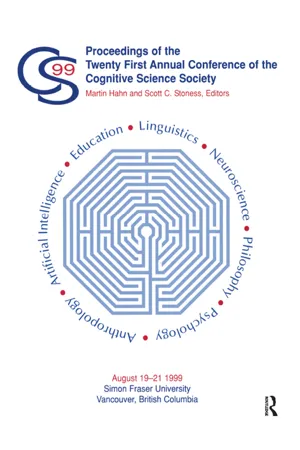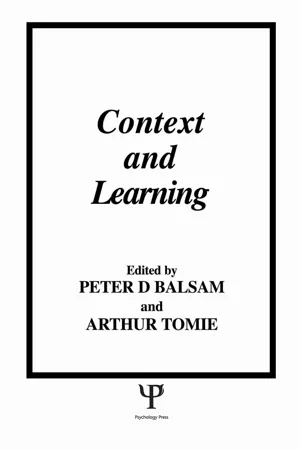Context-Dependent Memory
Context-Dependent Memory refers to the phenomenon where our ability to remember information is influenced by the environmental and situational context in which the information was learned. This means that we are more likely to recall information when we are in the same context or environment in which we initially learned it. This concept has implications for learning and memory processes.
5 Key excerpts on "Context-Dependent Memory"
- Martin Hahn, Scott C. Stoness, Martin Hahn, Scott C. Stoness(Authors)
- 2020(Publication Date)
- Psychology Press(Publisher)
...Context-Dependent Memory has also been studied with more moderate changes of context, as, for example, in studies where encoding and recall took place in different rooms (e.g., Smith, Glenberg, & Bjork, 1978; Smith, 1979). Similarly, mood-state dependent memory has been supported and challenged by numerous studies with both clinical and normal populations, using both real-life as well as laboratory memory material (for reviews, see Bower, 1981, Christianson, 1992, and Eich, 1995). The main idea behind the work on Context-Dependent Memory is that memories become more accessible when environmental or internal factors at retrieval are similar to circumstances at encoding. In the present paper, it is proposed that language may lead to similar state-dependency effects. The concept of language-dependent memory is introduced, suggesting that the linguistic ambiance at the time of retrieval influences recall of memories, so that memories become more accessible when language at retrieval matches language at encoding. In its broad application, language-dependent memory may occur both for semantic and for episodic memories. It may be observed with monolingual as well as multilingual speakers, when factors in the linguistic environment undergo significant change. The phenomenon of language-dependent memory appears to be particularly evident in the memories recalled by bilinguals. Bilinguals have an opportunity to experience life events while using different languages, and the drastic differences between the two linguistic environments may be particularly conducive to studying language dependency. If language is a key factor in memory encoding, then language of retrieval should affect the accessibility of a bilingual’s memories. Indeed, anecdotal evidence supporting this hypothesis is abundant...
- eBook - ePub
Theoretical Aspects of Memory
Volume 2
- Michael Gruneberg, Peter E Morris, Michael Gruneberg, Peter E Morris(Authors)
- 2006(Publication Date)
- Routledge(Publisher)
...6 THEORETICAL PRINCIPLES OF Context-Dependent Memory S.M.Smith INTRODUCTION When contextual cues affect remembering, memory is said to be context-dependent. Along with memory’s dependence upon practice, similarity and temporal factors, contextual cueing represents one of the basic mechanisms used in theories of memory (e.g. Anderson and Bower 1973; Glenberg 1979; Hintzman 1988; Kintsch 1974; Raaijmakers and Shiffrin 1980; Thomson and Davies 1988). Context-Dependent Memory implies that when events are represented in memory, contextual information is stored along with memory targets; the context can therefore cue memories containing that contextual information. There are many different operational definitions of context. ‘Context’ refers to that which surrounds a target, whether the surrounding is spatial, temporal or meaningful in nature. The present chapter will be limited to considerations of incidental context—that is, spatial and temporal contexts that are not obviously related to the targets on a memory test. The literature on meaningful contexts encompasses many research domains, including encoding specificity (e.g. Tulving and Thompson 1973), depth and spread of processing (e.g. Craik and Tulving 1975), and complex representational structures, such as scripts (e.g. Schank and Abelson 1977), schemata (e.g. Thorndyke 1977) or mental models (e.g. Glenberg et al. 1987). Although meaningful contexts may adhere to the same principles as those that apply to incidental contexts, they may also give rise to other meaning-driven phenomena that are beyond the scope of the present chapter. This chapter will first briefly review empirical evidence related to incidental and Context-Dependent Memory, including environmental context- and state-dependent memory. These two research domains have found parallel patterns of results, implying that there are similar mechanisms at work...
- eBook - ePub
The Foundations of Remembering
Essays in Honor of Henry L. Roediger, III
- James S. Nairne, James S. Nairne(Authors)
- 2011(Publication Date)
- Psychology Press(Publisher)
...In general, context is the term used to describe the joint contribution of all of these factors to the mental state of a person at a given time. Some of the more important of these factors are: (1) information manipulated by the investigator (other than the nominal target of memory testing itself), such as adjacent words in a word list, the computer monitor background, and the room setting in which study and testing might occur; (2) external environmental information that is in principle identifiable and measurable, but not manipulated (such as the temperature of the laboratory, the font of orthographic study materials, the instructions, the illumination conditions); (3) external environmental information that is not manipulated and difficult to identify and measure (such as the changing external verbal and ambient auditory noise, air currents, transitory vibrations, movements of the participant in her or his seat during testing); (4) internal bodily conditions, mental and otherwise, that are measurable and identifiable (e.g., verbalizable strategies, body temperature, heart rate); (5) internal information not readily identifiable and measurable (such as various cognitive states and strategies, transitory perceptions and thoughts, evanescent bodily changes like itches and stomach upsets). Many theories assume that some of this information is stored in memory with events, and also used to probe memory during retrieval. Researchers: (1) sometimes assume context is unattended, though this does not have to be the case; (2) typically assume context refers to factors not manipulated by the experimenter, though some theorists include nearby events as part of the context for a given event (e.g., nearby words in a study list—see Howard & Kahana, 2002); (3) often define context to exclude content information directly tied to the study event (such as the meaning of a word)...
- eBook - ePub
- Alan J. Parkin(Author)
- 2014(Publication Date)
- Psychology Press(Publisher)
...Retention testing involved participants identifying the target words which were again embedded in biasing sentences but, in half of these, the sentence was biased toward a different meaning to that used at learning (e.g. They enjoyed eating the JAM). Recognition was substantially reduced when the bias changed between learning and test, thus indicating a strong effect of intrinsic context. In many ways we should not be surprised at the Light and Carter-Sobell result. What has been demonstrated, in effect, is that if you learn one thing and test for another you get impaired memory; a good example of transfer appropriate processing. What is far less clear is what we should expect when the extrinsic context is manipulated because, here, the contextual changes have no apparent relevance to what has been learned. Environmentally dependent memory The idea that the environment within which we learn might have an impact on how we remember has a long history. Dulsky (1935) showed that paired associate learning was impaired if the background colour in the learning phase is altered at test. Abernethy (1940) showed that classroom learning was affected when testing took place in a different room and reduced further when a different teacher was present. The most well-known example of environment dependent memory comes from a study by Godden and Baddeley (1975) who examined memory performance in two distinct environments: on land and underwater. It was found that free recall was better when the learning and test environments were the same than when they were different. However, Godden and Baddeley found no similar effect when a recognition test was used. Smith (1986) reports a similar study in which participants undertook a number of memory span trials either in a room or while immersed in a flotation tank. They were then given an unexpected final memory test for the items and a significant environment-dependent effect was found for both recall and recognition...
- eBook - ePub
- P. Balsam, A. Tomie, P. Balsam, A. Tomie(Authors)
- 2014(Publication Date)
- Psychology Press(Publisher)
...Both of these factors suggest that it was the potentiated retrieval seen soon after training in the training context relative to the nontraining context that was now influencing behavior in both the training and nontraining contexts. Assuming a facilitated retrieval explanation of contextual potentiation, this broadening of the generalization gradient for the conditioning context could result in subjects forgetting not the central attributes of the conditioning context (e.g., "different from home cage"), but those finer attributes of context that would change with switches in test context. Such differential forgetting of select attributes from a larger memory is well documented in the human memory literature (Bower, 1967; Underwood, 1969). Context as a Comparator The preceding comments concerning the contributions of the test context to the contextual cue effect are based upon a relatively large number of independent studies. Thus, contextual summation and potentiation effects, if not their explanations, must be considered seriously; the major empirical questions about these phenomena that are yet to be answered concern not reliability, but the generality, power, and processes underlying these phenomena. The data base supporting the third role of context that we now discuss is smaller. We describe what evidence currently exists, but further research concerning reliability and generality is clearly necessary and is in progress. However, the importance of the related phenomena is sufficient to justify its incorporation in this review of the associative effects of context that influence retrieval and performance. In the late 1960s, a number of studies found that asymptotic conditioned responding depended not only on the percentage of instances in which the CS was immediately followed by the US (i.e., contiguity), but also on the percentage of instances in which the absence of the CS was immediately followed by the US (i.e., contingency, see Rescorla, 1967)...




